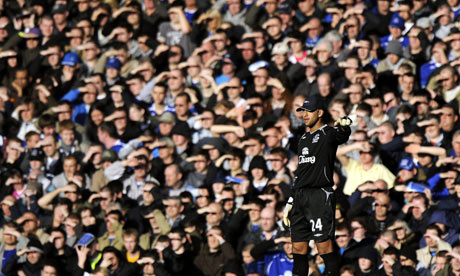
Everton enter the critical phase of their attempt to relocate to a new stadium in Kirkby today with a warning that they will struggle to remain competitive in the Premier League should a public inquiry rule against the controversial scheme. The grim prediction came from the club's acting chief executive, Robert Elstone, who claimed Everton are already over-reliant on the manager, David Moyes, for stability and have no alternative but to leave the city of Liverpool after 130 years.
After a decade of investigation and rancour, the failed Kings Dock project, and with calls for a shared stadium with Liverpool resisted by both sides of the Merseyside divide, Everton are now at the mercy of the government as they seek to move into a 50,000-seater, £150m stadium in August 2011. The public inquiry is scheduled to run until January 16 with a decision from the inspector, Wendy Burden, expected in spring 2009. Possible legal challenges to the inspector's decision could delay the final verdict, however.
Everton insist they have exhausted all possibilities of redeveloping Goodison Park and sites within Liverpool and that the Kirkby scheme, part of an overall £400m retail and stadium development led by Tesco, represents the only viable option for a club that is struggling to attract fresh investment. Last week Keith Harris, the merchant banker charged with finding a buyer for Bill Kenwright's majority stake, revealed he was making "no progress at all" in that search. Now Elstone has admitted Everton face an uncertain financial future if they are refused permission to leave Goodison for Kirkby.
"This is a monumental, historic couple of months for this football club and we have done everything we can to see if there are any viable alternatives," said the acting chief executive, who stepped into the role following Keith Wyness' resignation in July. "In our opinion there aren't any, and if this club is to continue to compete at the top end of the Premier League we need a favourable decision next year. This is a critical battle that we have to win.
"At the moment we are heavily exposed on the performance of the football manager. Two business models have emerged in the Premier League: the billionaire businessman who can underwrite anything the manager wants and the fanbase, facility-led model that has proved so successful for Manchester United and Arsenal. If you have neither, you need a manager who can consistently outperform his peer group and Everton have benefited from that in recent years. But we have the fanbase and potential at Everton to follow the second route and the Kirkby project offers that."
Everton have to contribute £78m towards the stadium but will not disclose to the inquiry how they will meet those costs, a decision they claim is owing to "commercial sensitivity" and has attracted criticism from opponents of Tesco's planning application. Those opponents include Knowsley's neighbouring authorities of Liverpool, Sefton, West Lancs, St Helens and Lancashire county council, plus Grosvenor Limited, the property company behind the recent £1bn transformation of 42 acres of Liverpool city centre.
Their objections are to the huge retail element of the project, not the stadium, which they claim breaks local, regional and national planning policies and prompted the government to "call in" the plans in August. Other objections come from the Kirkby Residents Action Group, while the vociferous Keep Everton In Our City group will present its case against a stadium that has created bitter division among supporters, but was supported by 97.1% of shareholders at an emergency general meeting convened to discuss the move in September.
KEIOC have criticised Everton for not having a Plan B, although the club insist Liverpool city council cannot provide a site with an essential enabling development attached, and advocate a redeveloped Goodison or a new stadium within the district of Everton. They claim a 55,000-seater stadium costing £220m, plus a hotel, can be constructed on an alternative site and part- financed through Equity Seat Right, a product offered by the Morgan Stanley-owned Stadium Capital Financing Group which sells seats at a fixed price for the lifetime of a stadium.
"Goodison is outdated and we acknowledge that facilities need to improve to generate more income," explained Colin Fitzpatrick, a spokesman for KEIOC. "But to us and many others Kirkby has the potential to become a white elephant with little use to Everton as a means of increasing revenue streams. Everton, unlike Tottenham or Liverpool, doesn't have a waiting list for season tickets and people don't want to go to Kirkby."
Upwardly mobile
Everton
With their stadium partners, Tesco, tomorrow they face the start of a public inquiry into their proposed 50,000-capacity arena in Kirkby, with the hope of a decision early in 2009.
Liverpool
Indebted to the tune of £350m, owners Tom Hicks and George Gillett cannot finance their planned 61,000-seat stadium. Move to Stanley Park is off while rumours of the club's sale persist.
Tottenham Hotspur
The first round of public consultation on 60,000-seater stadium closes today. A planning application will be lodged next year when this process is completed.
West Ham United
West Ham's hopes of leaving the Boleyn Ground have gone the way of the Icelandic economy. Long term the club have three options: increase capacity of Upton Park, build a new stadium on a Parcel Force site or move to the Olympic stadium post-2012.
Portsmouth
Despite persistent rumours of an impending takeover the club insist that they will lodge a planning application early next year for new 36,000-seat stadium on Horsea Island.
Chelsea
The club hope to redevelop the Stamford Bridge site but have not ruled out a move.

